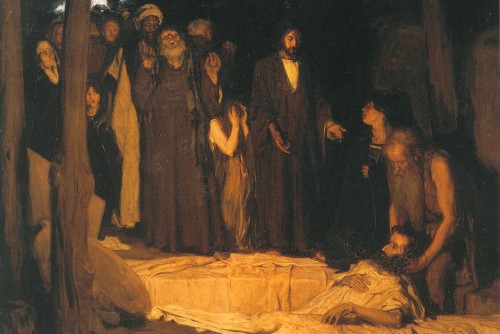This is a rich passage (John 11:1-46) and there are a ton of things we could look at today. I would like to just touch upon a couple aspects. The first is the emotional outburst of Jesus when he wept at the tomb of Lazarus. If John thought it worth mentioning in his highly edited account, it must be significant.
If you’ve ever played a round of bible trivia, I’m sure you’ve come across the fact that John 11:35 is the shortest verse in the New Testament. “Jesus wept”. Think about it for a moment though. Who was God? Who was there at the creation of the universe and knew the entirety of the future? Jesus! Shouldn’t he have been as cool as a cucumber in the face of death? So what’s with the crying? Was he just faking it? He couldn’t have seriously been sad, could he? Wasn’t he about to fix everything! Was it just some sort of act?
I remember being confused about this when I was young, and even sometimes today it makes me raise an eyebrow and reconsider what I believe. Some people have used this sort of emotional outburst from Jesus to try and show that he wasn’t really God. Sure, he was a pretty special guy who did miracles and taught some hidden truths about heaven and such, but if he were really God, he wouldn’t have needed to get upset about anything. (And this is by no means the ONLY time Jesus got upset, annoyed, or even angry about something!)
Consider what it would be like if you were playing a game of poker and were fortunately dealt a straight flush. Would you be sad? Of course not. You’ve got the winning hand and you can pull in a lot of chips if you can just look nonchalant for a few minutes. Jesus had the trump card over death – the power to bring Lazarus back at a command. In fact, he had planned from several days earlier to do just that! Was Jesus just playing games with us?
I believe that to resolve these questions we must go back to the doctrine of the incarnation. We as Christians believe that Jesus Christ was 100% fully God, but also 100% fully man. Not 50/50. Not God dressed up in a human body. Not a guy filled with some of God’s power. He was (and is) one person with two natures: A divine nature and a human nature.
Jesus as God was eternal, here forever since the beginning. Jesus as Man was temporal, on earth for just a few years in the first century. Jesus as God was infinite, knowing all the past and future in every imaginable sense and more. Jesus as man had eyes, ears, hands, mind, and body just like we do. When he helped Joseph build a table in the carpentry shop, he only had two hands to hold the wood with. When he had a long day, he ended up tired and hungry. None of this was fake; it was completely natural for him. Unlike us though, he was uncorrupted by sin. Doing the will of his father was his only delight.
You won’t find a one-off bible verse to fully explain this idea of the two natures of Christ, but it’s something that Christians thinkers and leaders had been puzzling over from the very beginning. Most of it was all hashed out in a meeting called the Council of Chalcedon that took place in 451 A.D. Nearly all Christians of every flavor have held to this God-man explanation about who Jesus was ever since then.
This isn’t just an old idea to make sense of some confusing scripture passages. A right understanding of who Jesus really was and who WE really are is not at all something you can assume that we all have a handle on. In our modern world, there is a lot of confusion about whether what goes on inside our minds is entirely physical or something soulful or spiritual. Many scientists and psychologists today say that faith in God is just a curious combination of chemicals inside your brain. Some Christians say the utter opposite – that, for example, depression is entirely the result of sinful unbelief and can’t possibly have anything to do with stress, or diet, or sleep or medication. Jesus will have none of these divisions – serving as our mediator by being just like us, and just like God.
Some Buddhists say that someone who is properly enlightened has no need to cry or grieve at a funeral. I think sometimes that is what we expect of Jesus. But God seemed to think grief was entirely called for at times! Jesus wasn’t a holy robot unaffected by the lives of people around him. When Mary fell at his feet crying, he empathized with her and cried too. He affirmed her anguish. It was the right thing to do. Jesus never did anything wrong! When he arrived at the tomb and came face to face with the death of a close friend, he was upset. Jesus hated death and promised to destroy it. It was JUST for him to be trouble when it touched him and those around him.
Remember it is the manly, human nature of Jesus that was troubled, not the eternal, immutable Godly divine nature. There is no sin or unbelief in the sort of emotion we see displayed by Jesus. If we are like him, we may very well be upset by death – taking no pleasure in it. This is conjecture, but I think perhaps Jesus was also troubled by the thought of his own upcoming death. He knew that it would be physically and psychologically difficult to endure, though his faith in the father would never wane.
I know there are people in this church right here that have lost loved ones and family in just the past week! If what we read in John today is any indication (and I believe it is), if Jesus were here in the room today, he wouldn’t tell the grieving people to get tough, nor would he wave them off saying, “Hey, don’t worry, it will all be cool later.” He would cry right along with them. We can do that too. He’s already arranged to take care of it all in the end.
The last enemy to be destroyed is death.
(1 Corinthians 15:26)
So, what does this actually mean to us today? Well, I think we can relate this to what Hebrews 4 tells us about Jesus.
For we do not have a high priest who is unable to sympathize with our weaknesses, but one who in every respect has been tempted as we are, yet without sin.
(Hebrews 4:15)
When we face all sorts of trials and troubles and sadness here on earth, Jesus knows how terrible they really make us feel. He is not a big entity in the sky that rolls his eyes at our smallness and instability. He became very small just like us, because he loved us so much. Jesus doesn’t just steamroll death as if it were something insignificant. He weeps. And then he stands up and commands.


